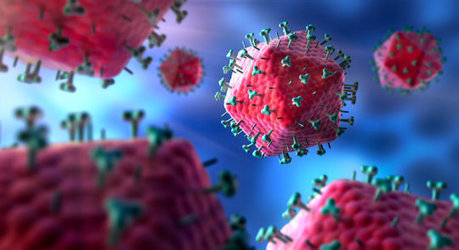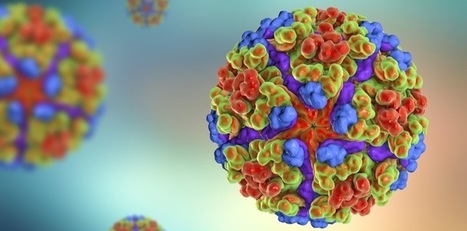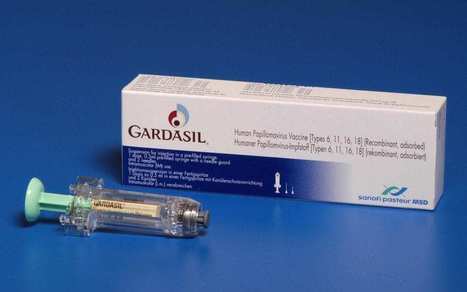 Your new post is loading...

|
Scooped by
Juan Lama
|
A novel experimental vaccine against respiratory syncytial virus (RSV), a leading cause of severe respiratory illness in the very young and the old, has shown early promise in a Phase 1 clinical trial. The candidate, DS-Cav1, was engineered and developed by researchers at the National Institute of Allergy and Infectious Diseases (NIAID), part of the National Institutes of Health, who were guided by their atomic-level understanding of the shape of an RSV protein. An interim analysis of study data showed that one dose of the investigational vaccine prompted large increases in RSV-neutralizing antibodies that were sustained for several months. First described in 1956 as a cause of infant pneumonia, the health burden of RSV has long been underappreciated. In fact, the virus is an important contributor to serious illness worldwide and causes as many as 118,000 deaths annually among young children. In the United States each year, RSV infections account for approximately 57,000 hospitalizations and 2 million outpatient clinic visits among children younger than five years old, according to the Centers for Disease Control and Prevention. “A vaccine to prevent RSV is a long-sought goal that has eluded us for decades,” said NIAID Director Anthony S. Fauci, M.D. “The early results of this trial suggest that this structure-based strategy for developing an RSV vaccine may bring that goal within reach.” After four weeks, levels of RSV-neutralizing antibodies in those who received 50 µg of vaccine (with or without alum) had increased sevenfold over the levels present prior to vaccination. A single dose of 150 µg without alum boosted neutralizing antibody levels 12-fold, while alum-adjuvanted vaccine at that dose prompted a 15-fold surge in neutralizing antibodies. The vaccine-induced antibody levels greatly exceed those seen following natural RSV infection in human challenge trials (where healthy volunteers are exposed to pathogens under carefully controlled conditions in order to observe the course of infection), when neutralizing antibody levels merely triple over those present before infection. Original findings were published in Science on 02 August 2019: https://doi.org/10.1126/science.aav9033

|
Scooped by
Juan Lama
|
Efforts to develop an effective HIV vaccine have repeatedly stumbled on one tough research strain, SIVmac239. Nicknamed the 'death star' strain, it has defeated multiple anti-HIV vaccine and antibody candidates, until now. Scientists have just beaten the 'death star' with a gene-therapy-style, nontraditional vaccine that prompts muscle cells to manufacture protective proteins. A team at the Scripps Research Florida campus reports successfully beating that challenge. In a paper published in the journal Science Translational Medicine today, lead authors Michael Farzan, PhD, and Mathew Gardner, PhD, describe their destruction of the "death star" strain and another especially hard-to-fight strain, suggesting it may be possible to protect uninfected individuals from multiple forms of HIV. Their nontraditional vaccine achieved another critical goal: durability. This means it protected the research animals from infection long-term, with a single inoculation, Farzan says. "We have solved two problems that have plagued HIV vaccine studies to date -- namely, the absence of duration of response and the absence of breadth of response," Farzan says. "No other vaccine, antibody or biologic protects against the two viruses for which we have demonstrated robust protection." Conventional vaccine approaches typically use a piece of virus or other immunogen to activate an immune system response. Because HIV replicates and changes so quickly, that approach has proven challenging. Farzan's approach uses a safe virus to fight the dangerous one, and relies on muscle cells rather than immune cells to generate protective agents. Here's how: A harmless, lab-made adeno-associated virus (AAV) carries within it a protective protein designed by Farzan and colleagues to stop HIV infectivity. Called eCD4-Ig, the protective protein features two HIV co-receptors, CD4 and CCR5. The latter was discovered by Farzan and his team over a decade ago. Farzan's viral vaccine is injected into muscle. It "infects" the muscle cells, which causes them to produce the protective eCD4-Ig. During exposure to HIV, the HIV virus is attracted to eCD4-Ig. It binds, and then "undergoes conformational change prematurely, and it's no longer able to infect," Farzan says.... The study was published on July 24 in the journal Science Translational Medicine: https://doi.org/10.1126/scitranslmed.aau5409

|
Scooped by
Juan Lama
|
A promising vaccine that clears an HIV-like virus from monkeys is closer to human testing after a new, weakened version of the vaccine has been shown to provide similar protection as its original version. The vaccine uses a form of the common herpes virus cytomegalovirus, or CMV—was live-attenuated, or weakened so CMV couldn't spread as easily. The new version still managed to eliminate SIV, the monkey version of HIV, in 59 percent of vaccinated rhesus macaques. That result is similar to earlier findings involving the vaccine's original, non-attenuated version. The immunity generated by the attenuated vaccine was also long-lasting, as nine of 12 vaccinated monkeys could still fight off SIV infection three years later. "These papers are important because they recapitulate the previously reported unique CMV vector efficacy with a genetically modified vector that is highly attenuated and therefore potentially safer for clinical use" said Louis Picker, M.D., a corresponding author on both papers. "In addition, this new work demonstrates most vaccinated rhesus monkeys that are protected against SIV can also be protected against a second challenge years after initial vaccination. This is a level of durability that would be very important for a human HIV vaccine". The CMV vaccine platform has been licensed by Vir Biotechnology, Inc., of San Francisco, which plans to lead a clinical trial with a human version of the CMV-based HIV vaccine. The studies were published on July 17 on Science Translational Medicine: https://doi.org/10.1126/scitranslmed.aaw2607 https://doi.org/10.1126/scitranslmed.aaw2603
|

|
Scooped by
Juan Lama
|
An experimental HIV vaccine that targets more strains of the virus than any other developed so far will start a late-stage clinical trial later this year. The ‘mosaic’ vaccine, which incorporates genetic material from HIV strains from around the world, also seems to have the longest-lasting effects of any others tested in people. Small trials of the mosaic vaccine in people showed that it prompted an immune response, such as the production of antibodies, against HIV. But starting in September, scientists will test it in thousands of people to assess whether the vaccine provides any protection against HIV infection. The phase III trial will test the vaccine in transgender individuals and in men who have sex with men across the Americas and Europe. These communities are disproportionately affected by HIV, with about two-thirds of new infections in the United States occurring among gay and bisexual men, according to the US Centers for Disease Control and Prevention. The team running the trial, which they’ve named Mosaico, discussed the project during the 10th International AIDS Society Conference on HIV Science in Mexico City last week. More than 100 HIV vaccines have been tested in people in the past three decades, but only one has demonstrated any kind of protection. In 2009, researchers announced the results of a study conducted in Thailand that showed that shortly after participants received an experimental vaccine, they were almost 60% less likely to become infected with HIV than those given a placebo. But the effects waned within a year — by the end of the 3.5-year study, vaccinated individuals were only 31% less likely to become infected. Small laboratory tests of the Mosaico vaccine in people showed that it elicited strong immune responses for at least two years after researchers administered it. These responses seem to be more durable than those observed in the Thai vaccine trial, says Guido Silvestri, an AIDS researcher at Emory University in Atlanta, Georgia. The latest Mosaico study will enrol 3,800 participants across 8 countries, including Argentina, Italy, Mexico, Poland and the United States. Half of the participants will get four vaccine injections over the course of a year, and the other half will receive a placebo. News published on July 31 2019 in Nature: https://doi.org/10.1038/d41586-019-02319-8

|
Scooped by
Juan Lama
|
The French vaccine developer Valneva has received a €21M ($23.4M) grant to catch up with the competition in commercializing the first potential vaccine for the chikungunya virus. Coming from the nonprofit Coalition for Epidemic Preparedness Innovations (CEPI), the grant will boost the manufacturing and development of Valneva’s vaccine for the tropical disease chikungunya, which causes fever and can trigger chronic pain in the joints. Chikungunya has long been a problem in developing countries with endemic tropical diseases, but has received less attention from developed countries until recently. However, climate change could increase the range of disease-carrying mosquitoes, and chikungunga outbreaks in Europe could become more common. Companies developing vaccines for the disease could deliver an important weapon in the fight against the disease. In May, the vaccine showed the potential to protect against the virus in a phase I trial. As the company has already calculated an optimal dose, Valneva’s one-shot vaccine could skip phase II and head directly to phase III. The Austrian biotech Themis Bioscience is also developing a vaccine for chikungunya, which is expected to enter phase III later this year. With a phase III trial expected to begin in early 2020, Valneva might narrow Themis’ lead in the race to get the first chikungunya vaccine to the market. The CEPI allocates grants to fund the development of vaccines against infections causing humanitarian crises. CEPI also recently provided a 19M euros grant to Themis, with the aim of accelerating vaccines for chikungunya and other diseases to the market.

|
Scooped by
Juan Lama
|
More than 100,000 cases of cancer will be prevented under plans to give boys the HPV jab as well as girls, UK health officials have said. Giving boys the vaccine protects girls from the human papilloma virus (HPV), which is passed on through sexual contact. And it will also protect them from a range of other forms of the disease, including some cancers of the head and neck, and penile, anal and genital cancers. Scientists hope that cervical cancer could be eradicated within decades, because of the success of the jabs. Since the vaccine was introduced for teenage girls in 2008, cases of HPV have fallen by 86 per cent among the age groups vaccinated. Professor Beate Kampmann, director of the vaccine centre at the London School of Hygiene and Tropical Medicine, said: "This decision is a triumph for gender equality in cancer prevention. "It's pleasing to see the UK follow the example of other countries like Australia, where the vaccine has been implemented for girls since 2007 and for boys since 2013." Estimates from the University of Warwick suggest the vaccine will prevent 64,138 cervical cancers and 49,649 non-cervical cancers in the UK by 2058. This will include 3,433 cases of penile cancer and 21,395 cases of head and neck cancer, such as throat cancer, in men. UK Health report available at: https://www.gov.uk/government/organisations/public-health-england
|



 Your new post is loading...
Your new post is loading...













